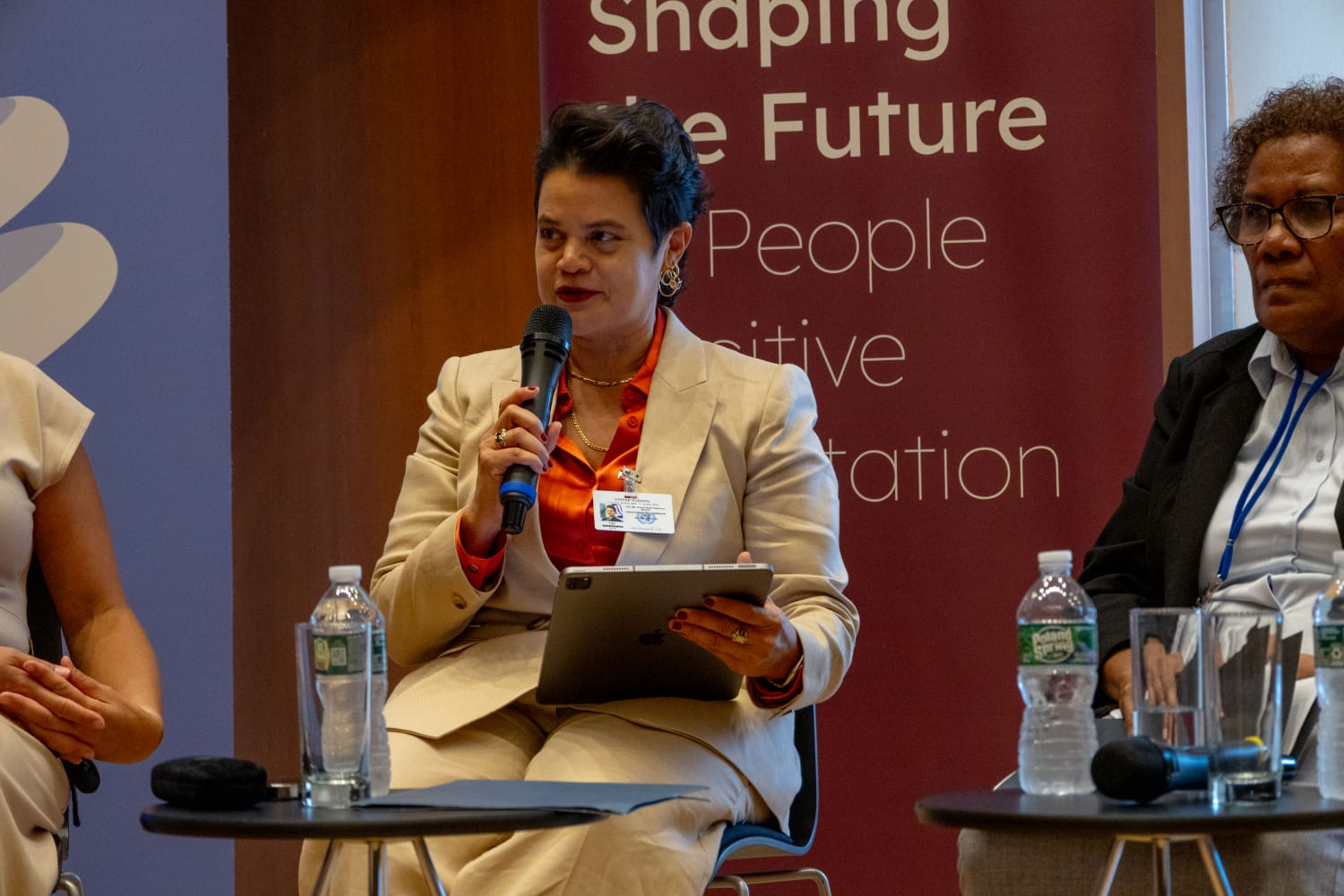Intervention by ACS Secretary-General Noemí Espinoza Madrid at the Side Event on Climate-Induced Mobility, organized by the Global Centre for Climate Mobility during the 2025 High-Level Political Forum on Sustainable Development

I deeply appreciate the invitation to this space, which calls us to engage in dialogue around one of the most urgent and human dimensions of the climate crisis: climate-induced mobility.
It is an honor for me to participate on behalf of the Association of Caribbean States. I especially thank the Permanent Mission of Germany and the Global Centre for Climate Mobility for organizing this event.
The ACS is the main mechanism for consultation, cooperation, and concerted action in the Greater Caribbean. We bring together continental and island countries that share a common geographic and cultural space—united by the Caribbean Sea.
The ACS was created from the conviction that shared challenges require shared solutions, with the aspiration of promoting the well-being of all countries that border the Caribbean Sea.
Since 2022, the ACS has provided political leadership and regional legitimacy to ensure this initiative reflects the voices and realities of our population.
Mobility is part of the human condition. But when mobility is forced, caused by natural disasters or environmental degradation, it cannot be left to chance.
When displacement is driven by climate conditions, we have an ethical responsibility to ensure it happens in a safe, dignified, and planned manner. Migration must become a pathway for positive adaptation.
The problem is not migration itself, but the conditions under which it occurs or migrants are received. This affects not only those in mobility situations but undermines our ability to solve broader challenges like poverty and inequality.
In the Greater Caribbean, we face a significant data challenge. While there's regional data for Latin America and the Caribbean, there's limited consolidated information specifically for the Greater Caribbean—especially on mobility.
The Great Caribbean Shifts report, produced by the ACS, the Global Centre for Climate Mobility, and UN agencies, is a fundamental step in advancing evidence-based solutions.
It helps us understand how many people are at risk, where they may need to move, and what is required to ensure mobility doesn't create a double burden on origin and destination communities.
This data is essential to managing services and designing human-centered, preventive public policies.
As in many dimensions of inequality, women are often the most affected.
While men migrate seeking new opportunities, women are left in charge of households, dependents, and land—often in very vulnerable conditions.
This reinforces existing inequalities and jeopardizes both the right to mobility and the right to remain in dignity and with autonomy.
Most natural disasters we face are a result of climate change—a crisis to which not all countries have contributed equally.
Those who have contributed the least often suffer the most devastating consequences.
This underscores the urgent need to strengthen financing mechanisms, not only for disaster prevention, but also for loss and damage, ensuring resources reach the most vulnerable communities and support sustainable solutions at both origin and destination.
Climate mobility transcends national borders. Regional cooperation is critical.
A regional and international approach allows us to share resources, harmonize standards, and generate conditions that protect the rights of affected populations.
The ACS is reinforcing its technical leadership to manage large-scale, high-impact projects focused on disaster prevention, territorial planning, and climate adaptation.
We aim to bridge gaps between research, policy, and action, and to foster greater coordination throughout the Greater Caribbean.
A whole-of-government and whole-of-society approach—including governments, civil society, the private sector, international organizations, and local communities—is necessary for a coherent and effective response.
The partnership between the ACS and the GCCM that produced the Great Caribbean Shifts report shows that cooperation is possible and yields tangible outcomes.
We aim to build on this momentum, particularly ahead of COP30, a key opportunity to project the voice of the Greater Caribbean and put forward concrete proposals on mobility, climate justice, and resilience.
In Agenda 2030, we committed to making human rights a lived reality for all. People on the move must have their rights protected—especially when they are fleeing rising seas, prolonged droughts, or devastating storms.
Protecting these rights is more than a moral duty—it is an urgent obligation.
If we fail to protect them, no matter what the indicators say, we are failing.
It is up to us to find a way not to fail and ensure that every person can live with dignity.
Discours connexes
Intervention de la Secrétaire générale à la 1ʳᵉ réunion de la Sous-commission des sargasses
Excellences,
Distinguées expertes, distingués experts,
DISCOURS DE S.E. L'AMBASSADRICE NOEMÍ ESPINOZA MADRID, SECRÉTAIRE GÉNÉRALE, À L’OCCASION DE LA RÉCEPTION DE HAUT NIVEAU POUR LE LANCEMENT OFFICIEL DU RAPPORT SUR LA MOBILITÉ CLIMATIQUE DANS LA GRANDE CARAÏBE, LORS DU 3ᵉ SOMMET SUR LA MOBILITÉ CLIMA
Excellences,
Distingués délégués,
Mesdames et Messieurs,
DISCOURS DE S.E. NOEMÍ ESPINOZA MADRID, SECRÉTAIRE GÉNÉRALE, À L’OCCASION DE LA RÉCEPTION DE HAUT NIVEAU POUR LE LANCEMENT OFFICIEL DU RAPPORT SUR LA MOBILITÉ CLIMATIQUE DANS LA GRANDE CARAÏBE, LORS DU 3ᵉ SOMMET SUR LA MOBILITÉ CLIMATIQUE
Excellences,
Distingués délégués,
Mesdames et Messieurs,




